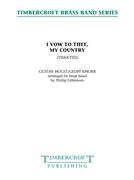Results
-
 £42.95
£42.95The Platinum Jubilee March (Brass Band - Score and Parts) - Shelton, Chris G.
The Platinum Jubilee March was written to celebrate Her Majesty, Queen Elizabeth II's seventy-year reign as monarch of the United Kingdom. Its premiere was televised live around the world as part of the Queen's Birthday Parade which marked the start of the national Platinum Jubilee celebrations.The Queen's Birthday Parade 2022 saw the First Battalion of the Irish Guards trooping their colour. To reflect this, the march begins in a celebratory style and features a melody based around the opening motif of Let Erin Remember - the regimental slow march of the Irish Guards. In traditional style, the march develops excitement both harmonically and melodically, creating a strong sense of drive before reaching a stately trio. This section has a very regal and noble feel, lending subtle harmonic nods to two of the most quintessentially British composers, Gustav Holst, and Sir William Walton. The march culminates in a bold grandioso, featuring semi-quaver lines that are underpinned by a driving trombone countermelody. A forthright restatement of the introductory fanfare brings the march to a very definite and resolved ending.
Estimated dispatch 7-14 working days
-
£29.95
Bleak Mid-Winter (Brass Band - Score and Parts) - Downie, Kenneth
Gustav Holst's 'In the bleak mid-winter' has become one of the best-loved of all carols. This arrangement is a thoughtful commentary on Holst's music, highlighting its wistful, plaintive qualities.
Estimated dispatch 7-14 working days
-
£14.95
Bleak Mid-Winter (Brass Band - Score only) - Downie, Kenneth
Gustav Holst's 'In the bleak mid-winter' has become one of the best-loved of all carols. This arrangement is a thoughtful commentary on Holst's music, highlighting its wistful, plaintive qualities.
Estimated dispatch 7-14 working days
-
£24.95
I Vow To Thee My Country (Brass Band - Score and Parts) - Holst, Gustav - Steadman-Allen, Ray
This noble tune was originally part of the 'Jupiter' movement of 'The Planets' suite and now also appears as a hymn tune called 'Thaxted'.
Estimated dispatch 7-14 working days
-
£12.50
I Vow To Thee My Country (Brass Band - Score only) - Holst, Gustav - Steadman-Allen, Ray
This noble tune was originally part of the 'Jupiter' movement of 'The Planets' suite and now also appears as a hymn tune called 'Thaxted'.
Estimated dispatch 7-14 working days
-
 £50.90
£50.90ERINNERUNG AN ZIRKUS RENZ (Xylophone Solo with Brass Band) - Peter, Gustav - Woodfield, Ray
Gallop for Xylophone and Brass Band. Grade: Easy/Medium.
Estimated dispatch 7-14 working days
-
 £74.95
£74.95FIRST SUITE IN E FLAT (Holst) (Brass Band - Score and Parts) - Holst, Gustav - Herbert, Sydney
Includes:ChaconneIntermezzoMarch
Estimated dispatch 7-14 working days
-
 £32.95
£32.95FIRST SUITE IN E FLAT (Holst) (Brass Band - Score only) - Holst, Gustav - Herbert, Sydney
Includes:ChaconneIntermezzoMarch
Estimated dispatch 7-14 working days
-
 £30.00
£30.00I Vow to Thee, My Country (Brass Band - Score and Parts) - Holst, Gustav - Littlemore, Phillip
!!I Vow to Thee My Country. Originally for unison voices with orchestra, Holst adapted it as a hymn tune and called it Thaxted , named after the village where he lived for many years. Because of the sentiment in the words it has now become a staple of Remembrance services.The American Composer, Geoff Knorr, incorporated Holst's music into his score for the strategy-based video game Civilisation, where it is used to depict the England of Elizabeth I. It is from this music that the transcription is made. Duration: 5.40
Estimated dispatch 7-14 working days
-
 £37.95
£37.95I VOW TO THEE, MY COUNTRY (Brass Band) - Holst, Gustav - Sparke, Philip
.
Estimated dispatch 7-14 working days
